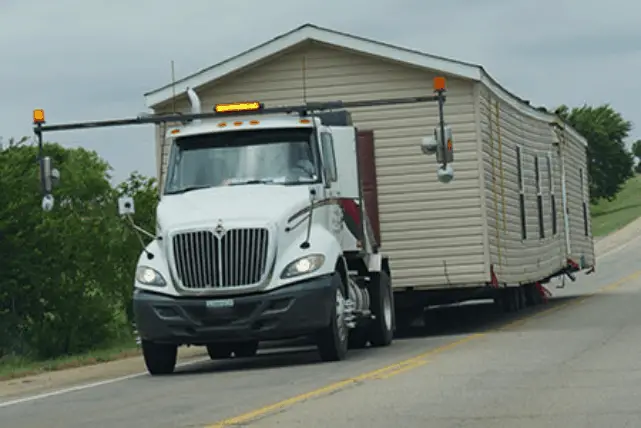“Mobile Home”! Just the name alone sounds like you should be able to easily hitch it up and haul it off to a new location. This was easier back in the early days when the homes were much smaller. Today, the process is a massive undertaking and expensive. It is much more involved than it used to be back in the day. So how much does it cost? Let’s take a look…
Table of Contents
SHORT ANSWER
- Singlewide – $1,000 to $8,000
- Doublewide – $2,000 to $16,000
- Triplewide – $3,000 to $24,000
At first glance you may wonder why there is such a wide variation in pricing. The prices depend largely on how much you do yourself and how much you pay others to have done. The lower end are just the prices for moving the home (maybe up to 60 miles or so). There are far more costs involved, so let’s dive in and take a look at what you can realistically expect to spend if you really want to move a manufactured home.
FACTORS TO CONSIDER
 Value Of The Home – In many situations, the cost of moving the home might be several times the actual value of the home itself. It is wise to look at what your end goal might be with the home. It might be more cost effective to just buy another home and sell your current home.
Value Of The Home – In many situations, the cost of moving the home might be several times the actual value of the home itself. It is wise to look at what your end goal might be with the home. It might be more cost effective to just buy another home and sell your current home.
-
- Did you buy some land? – Consider whether it might be better to sell the current home in its location and purchase a new or resale home and move it onto the property. This might be preferable if you are planning on moving an older multi-section home that has little value.
- Are you moving to a park? – In this case it is almost always a wiser financial decision to find a home already in the park of your choice and purchase that home. You could renovate the home to the nines with the cost savings from moving a home.
- Do you want to move to an area with your own land? – In this situation, you haven’t yet purchased the land. It might be far less expensive overall to find an existing manufactured home that is already on land that is for sale.
Mobile Home Park Trying To Prevent Your Move – Mobile home parks need to keep the park full in order to get a good return on their investment. They do not want to see homes leave their park. Many parks have a clause in their lease that they have first right of refusal if you plan on selling the home. That gives the park the opportunity to actually purchase the home from you if you sell. However, if you already own the home and you want to move it, they cannot legally get in your way. Often legal representation may be a necessity.
What Is The Distance Of Your Planned Move? – It goes without saying that the longer the distance of the move, the higher the cost will be. This is especially true if you are moving across state lines. Various permits and traffic requirements can add costs in a hurry. As stated above, always keep in mind the actual value of the home before deciding to move it.
Age Of The Home – If you have an older home, many modifications may be needed before you can even make the move, such as axles, wheels and tires. Take into consideration how your home might withstand a move.
Size Of Your Home – Of course it costs more to move a larger home than a smaller one and the size of your home will have a big impact on the price it costs to move. For example, if you home is too wide, you may have to pay for a police escort and temporary road closure. This all costs more.
Weight – This will affect the size of the equipment needed. Older mobile homes prior to the HUD standards set in 1976 typically weigh between 35 to 40lbs per square foot. Newer, post HUD, homes weight anywhere from 45 to 50lbs per square foot. A 960 square foot home could weight up to 48,000 pounds.
GETTING THE HOME READY
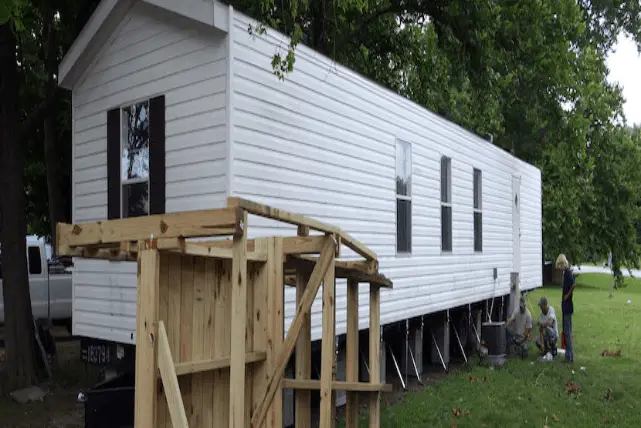
There is a lot of prep work just to get the home ready to move. These can include:
- Items To Remove:
- Skirting
- Decks
- Awnings
- Steps
- Landscaping
- Disconnect utilities
FOUNDATIONS
Not all mobile homes are on the same type of foundations. Some foundation types are more permanent than others. This is especially true if permanent stem walls have been built around the home in lieu of skirting. Also, have permanent piers been poured into place? If the home is entangled in this type of foundation, it can be difficult and expensive to extricate the home for moving.
Many homes may have attached rooms, sheds and other structures. An owner can save money by removing these items themselves if they have the skills. Also, these items usually do not survive a dismantling, so if you want the home to be outfitted the same in the new location, it will require all new materials. Those can ad up massively in a hurry.
To have all of this work done can cost a few thousand dollars itself (maybe more if a permanent foundation is in place). Be sure to get multiple bids before having the work done. Often, you might find less expensive labor if you have a handyman type of laborer do this work instead of the moving company.
Although the term “mobile” gives the idea of mobility for the home, it is not inexpensive. As mentioned many times in this post, take into consideration the value of the home you are looking to move. Often, you will find that it does not make financial sense.
AXLES, WHEELS AND TIRES
Often, when a home is set up, the axles and wheels are removed as they might be owned by the mobile home dealer. Even if the axles and wheels still exist underneath the home, they have usually been detached from the home. Also, the tires may have degraded to the point where they are no longer useful.
MOVING COMPANY
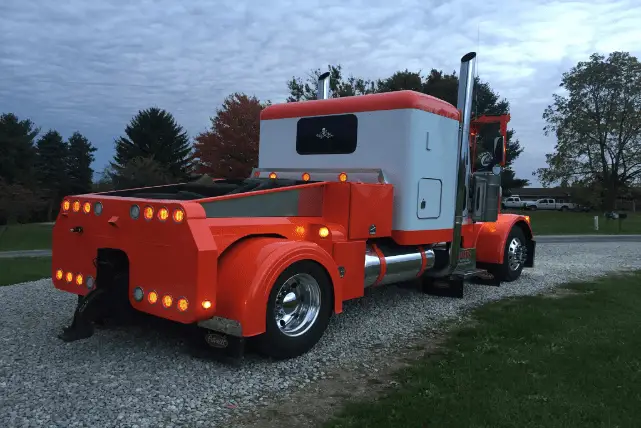
Not every mobile home moving company has the equipment and capacity to move every mobile home. Choosing the right mover depends on far more factors than just price.
As we are establishing in this post, moving a mobile home can be very expensive, especially if it involves a multi-section home. If the move is long-distance, across state lines and through multiple municipalities along the way it can complicate matters even further.
When we move a mobile home, price of course is very important. But, the ability of the moving company we select to get the move done properly is even more important. Just like with any industry, there are shady operators and also some great companies. When you are shopping companies, always let it be a red flag if the price you are quoted is far below other quotes.
Many mobile home movers are small operations, so getting one that can handle the entire operation can be tricky. The company needs to be competent in the following areas to begin with:
- Properly insured
- Properly insured to move across state lines (if this is a factor in your move)
- Familiar with all the permitting required
- Able to make all arrangements and preparations (chase cars, police escorts, etc.)
- Able to secure the needed permits
One of the best ways we’ve discovered to find good mobile home movers is to contact new manufactured home dealers. They are moving homes constantly and typically use more than one company. They have been a great source for us to find reputable home movers that they trust with their own business.
HOME PREPARATION
Consider how much of the prep work you want the moving company to do, and how much you can do yourself. Of course, the more you are able to do, the less expensive the price will be from the movers. Much of the prep work inside the home can be done by you. This includes:
- Securing doors
- Securing drawers
- Securing appliances
- Securing furniture
Keep in mind that as your home travels down the highway, there is a lot of movement and bouncing that takes place. If you don’t take the precautions to make sure that everything is secured in place, there may be significant damage inside the home once the move is completed.
Any moving company should check your axles, wheels and tires for safety and stability. Often, if you don’t have the axles, wheels and tires, we find that most moving companies have access to these. They will supply and install the equipment needed to make the move. Just keep in mind that there will be an extra charge for this. This will be part of the selection criteria that you work out with the moving company and you should plan on the expense.
LICENSING AND INSURANCE
Most manufactured home insurance policies do not cover the home while in transit. It is extremely important that you ensure that the moving company has the necessary coverage for every part of the move. Prior to making the agreement, ask about each type of coverage they carry. Do not use a company that has INADEQUATE insurance coverage.
TOOLS AND SUPPLIES
From hitches to axles, wheels and tires, moving a mobile home requires lots of supplies. A reputable mobile home mover should supply all materials necessary to move the home. make sure this is understood prior to finalizing the agreement with the mover. You don’t want any expensive surprises.
DETAILING THE QUOTE
As you are getting quotes for the move, ask the moving company to break the price down into components. There are a few reasons for doing this:
- There might be some items that you were not aware of that you can take care of yourself and save some money.
- By having the quote detailed out, you can avoid any miscommunication that may come up later with the moving company.
- The quoted price should include:
- Preparation
- Permits
- Fees
- Tolls
- Flat Tire Coverage
- Drivers Fees
- Liability Insurance
- Any work to be done at the destination site including cleanup.
Be sure that you know exactly what is being quoted. Will they leave the lot clean when the job is complete? Often, this is not done and it can make for some rocky times with the mobile home park if this is where you are moving the home. Make sure that they include lot cleanup on the quote.
You should determine what they are going to do with any sheds, decks or awnings as well. These are expensive exterior components of a mobile home. Buying new ones or even moving and setting up the existing can add thousands in expense to the move. There should be no miscommunication about what will be done throughout the move.
MOVING COMPANY REPUTATION
As mentioned earlier, many mobile home movers are sole proprietors and are small operations. Check the Better Business Bureau for any complaints that might be filed against them. Also, ask for references from the mover. Check each one and find out their relation to the moving company.
MOVING PERMITS
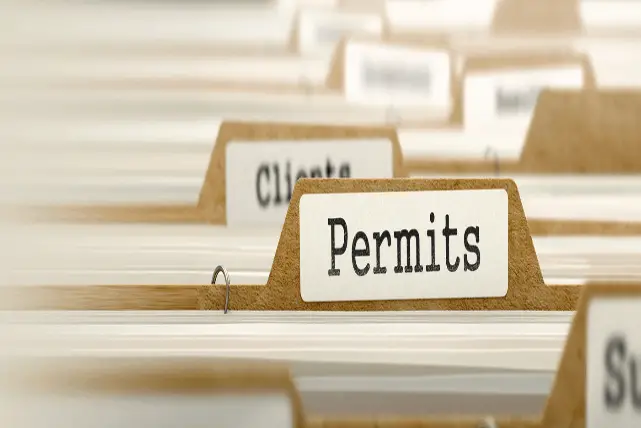
Most reputable moving companies will get permits for you. If the company you choose is a small but reputable company and does not pull the permits, then you have other options.
You could pull the permits yourself, but I would advise against this. Moving a mobile home is not something you do everyday and it might be easy to miss something important. When we first started to move mobile homes, I contacted a few new manufactured home dealers and asked them if they had a reference to someone who pulls the necessary permits for moving.
Using this method, I was given the name of a few individuals who perform this service at a modest cost. I have paid around $300 for the service plus the cost of the permits.
If you are moving your mobile home to a new county or a new state, you may have to pull permits for each area that your mobile home travels through. If you use a service to pull the permits they should know the answer to this. If you’re unsure, you might try contacting a mobile home dealer in your area and ask them if this is necessary.
Many locations also require a “set-up” permit in order to install your home in the new location. The county, town or city will send out inspectors at various stages of the setup to make sure that all the local codes are being adhered to.
COSTS OF THE MOVE

In our experience, we have found movers willing to just hitch up the home and move it within a 50 mile area for under $1,000. This does not include all of the work we have spoken about above such as assessing the house, getting it prepared, axles, wheels, tires and hitch. Nor does it include securing any of the permits.
Generally, once all the costs are added up, you can plan on spending anywhere from about $5,000 to $10,000 for a single wide home. For a double wide you can double the figures from about $15,000 to $20,000 to move the home and get it set up.
These are just rough estimates. The actual expense to move your manufactured home depends on a wide variety of factors.
- Labor costs
- Set-up costs
- Materials for the move
- Size of the mobile home
- Permits
- Transportation fees
- Distance of the move
Often, if the move is a short local move, the moving company may have a minimum fee that they charge. Rarely will you be able to get away for under $1,000 for just physically moving the home a few miles. Even if there is no preparation before the move or setup work after.
SETUP ON THE NEW SITE
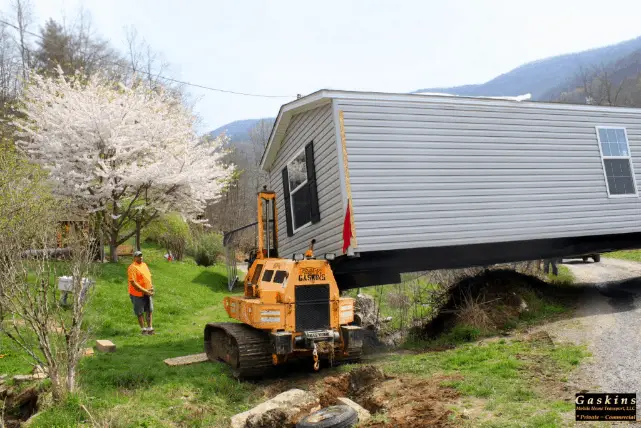
UNEXPECTED REPAIRS
Anything can happen when moving a mobile home. Whenever we move one, we always allow a contingency amount to make these repairs. When transporting a mobile home down the road, roof shingles may blow off, siding may be damaged, Some interior items may become lose or detached. Plumbing pipes underneath may be damaged. We usually plan on from $200 to $700 for any repairs caused by damaged during transport.
There may be an accident while en route. Your mover should be fully insured for these major items. Check with the moving company for what there insurance will cover during transportation of the home.
FOUNDATION
Getting the foundation set up at the new homesite can be one of the most expensive parts of a move. This is especially true if you are going to install the home on a more permanent type of foundation. Will you be putting down a new slab? Will you be installing a block foundation around the perimeter?
The least expensive system would be a compacted and graded pad underneath the home; using cement blocks, cement piers or steel piers for support. With any foundation type you will be required by local code for tie-down systems. Compacting and grading along with the piers and tie downs may run about $1,500 for a single wide home. This would include leveling.
More permanent type of foundations can quickly cost from $3,000 to $5,000 per home section.
UTILITY HOOKUPS
Utility hookups usually require inspections from the city or county as well as the utility companies where you will be moving the mobile home. As with any service there are fees for these inspections that usually run a few hundred dollars.
If you’re moving the home into a park, the park hookups are very straight forward and overall much less expensive than if you are moving the home to your own piece of land.
Listed below are some of the things we have experienced when moving homes.
- Water – This is one of the least expensive items. In a park, the water hookup is usually located right behind the home and is very simple. On your own land, you may have to trench for some distance to be able to meet up with the water supply source. We’ve had this cost range from about $200 dollars to well over $1,000.
- Sewer – In a park the sewer hookup is located below the home and is very simple. For a new lot location you may have to run a new sewer line out to the street or might even have to install a septic tank. Even if the lot had a mobile home on it previously, a new line or septic tank may be required because code may have changed since the previous home was installed. You should plan on spending from $2,000 on the low side to well over $5,000 for a new septic system.
- Electric – The last home we moved was to a lot where an older mobile home had previously been. The electrical box for that older home had been installed in the 1960s. We were required by the county and the utility company to run completely new lines and a new electrical box. With the trenching, new box, labor and inspections we spent over $1,200. It can run quite a bit more if you have to go quite a distance.
- Natural Gas – If your home uses natural gas for cooking or heating, then this also would need to be installed. Most parks do not have natural gas hookups, but if they do, it is usually located beneath the home for a simple and quick hookup. For a new lot install, it is very similar to hooking up a new sewer or water line and can easily cost $1,000 to $1,500.
- HVAC – Most mobile homes have the condenser and compressor unit outside of the home and unattached. This must be moved as well. To set up the electrical connections, coolant lines and setup will usually cost from $750 to $1,000.
SKIRTING
Most often skirting will have to be new whenever you move a mobile home. This is because most skirting, whether wood, aluminum or vinyl is custom cut for the location of the home. Materials and labor for skirting install on a single wide mobile home can quickly run about $1,000. A double wide will run about $1,500.
SLABS
Often, you will want to have concrete slabs poured for the foundation, sidewalks, porches, parking, etc. A good rule of thumb is about $5 per square foot of concrete poured. This can get into the thousands of dollars very quickly.
AWNINGS
You will probably want awnings installed for porches and for covered parking. Many folks will install awnings all the way down both sides of the home. An aluminum awning that is 8 to 12 feet wide can cost anywhere from about $45 per linear for to about $65 per linear foot. I usually figure about $3,500 for a home that is about 65ft long. The majority of this cost is in the materials. If your home has good awnings in the old location, you will want to carefully dismantle these and bring them for installation in the new location. This can save thousands of dollars.
Summary
Let’s take a look at a recent example of a home we moved. We bought a lot with an old dilapidated home on it. The home was unlivable and not worth renovating. We tore the old home down and purchased a new 16 x 60 mobile home to put in its place.
The original home was placed on the lot in the 1960s and it had the original electrical box and septic system. The county and the utility companies required that we put in a new septic system and electrical system because the old ones were not up to code. We did use the old sidewalks, driveway an porch slabs. Any cement flatwork would have cost us about $5 per square foot.
Our expenses ran as follows:
|
Item |
Cost |
|
Old home tear down and removal |
$2.500 |
|
Permit pulling service |
$300 |
|
Compact and grade lot |
$600 |
|
Trench and connect new water line |
$450 |
|
New electrical box, trenching and hookup |
$1,400 |
|
Septic Testing of original tank |
$250 |
|
New septic tank and hookup |
$4,500 |
|
Mover to move the home 3 miles from the dealer to the lot |
$350 |
|
Cement pier foundation and tie downs |
$2,200 |
|
Skirting |
$1,200 |
|
Steps |
$500 |
|
Awning on one side |
$3,300 |
|
Inspections |
$400 |
|
TOTALS |
$17,950 |
As can be seen from the above, it can be very expensive to move a mobile home. Many older homes simply are not worth anywhere close to the price of moving. It is often far less expensive to sell the old home where it sits. Find another home already in a desired location and make that purchase. With the savings you could really renovate the home you purchase to be an amazing dwelling.

